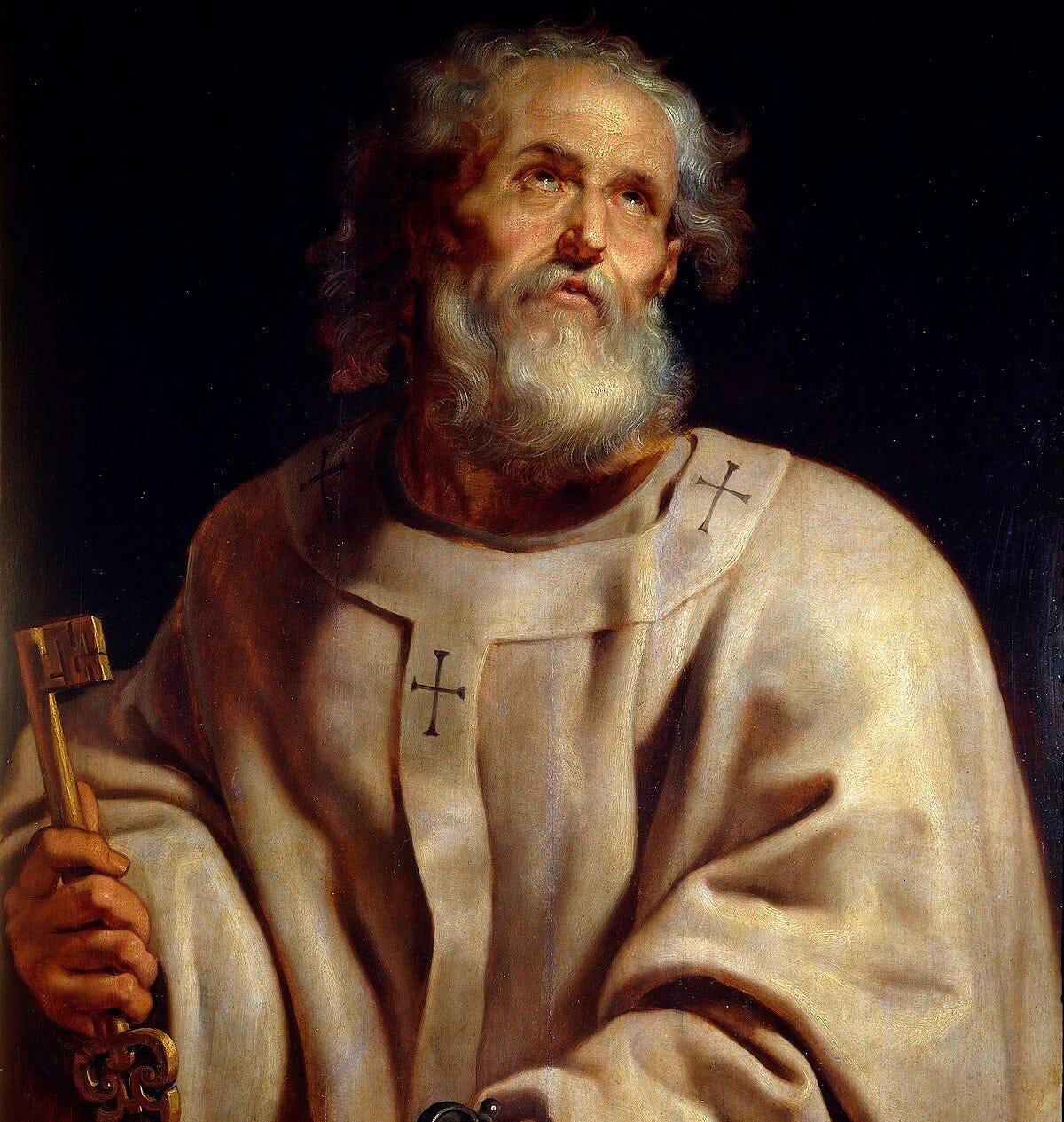The Successio Apostolica: A Brief Theological Exploration
Through Scripture, the Church Fathers, and Joseph Cardinal Ratzinger
Welcome to In Defense of Theology!
What to expect:
1️⃣ Tuesdays: I post a theological reflection loosely based on the latest episode of my podcast, Saints in the Parish. Missed it? You can catch up here.
2️⃣ Friday Paid-Subscriber Post: Start your weekend with the Sunday Theology Gospel Companion. This post unpacks a theological theme from the upcoming Sunday Gospel, offers a “Further Reference” section for deeper study, and includes two reflection questions to help you prepare your heart and mind for Mass.
**This post is for paid-subscribers only. If you would like to read the full content and all future paid-content, consider becoming a paid subscriber and support my work!**
The “four marks” of the Church are “One, Holy, Catholic, and Apostolic.”
As you might expect, these “marks” distinguish and set apart the One, Holy, Catholic, and Apostolic Church as distinct from any other religious institution.
In this Sunday’s Gospel, we will reflect on the call of Simon, James, and John—the first Apostles.
In Luke’s Gospel, we read:
While the crowd was pressing in on Jesus and listening
to the word of God,
he was standing by the Lake of Gennesaret.
He saw two boats there alongside the lake;
the fishermen had disembarked and were washing their nets.
Getting into one of the boats, the one belonging to Simon,
he asked him to put out a short distance from the shore.
Then he sat down and taught the crowds from the boat.
After he had finished speaking, he said to Simon,
"Put out into deep water and lower your nets for a catch."
Simon said in reply,
"Master, we have worked hard all night and have caught nothing,
but at your command I will lower the nets."
When they had done this, they caught a great number of fish
and their nets were tearing.
They signaled to their partners in the other boat
to come to help them.
They came and filled both boats
so that the boats were in danger of sinking.
When Simon Peter saw this, he fell at the knees of Jesus and said,
"Depart from me, Lord, for I am a sinful man."
For astonishment at the catch of fish they had made seized him
and all those with him,
and likewise James and John, the sons of Zebedee,
who were partners of Simon.
Jesus said to Simon, "Do not be afraid;
from now on you will be catching men."
When they brought their boats to the shore,
they left everything and followed him.
In this account, we witness the call of Jesus’s “inner circle.” Peter, James, and John, apart from the other 9 Apostles, constitute an intimate community with Our Lord. These three men witness the Transfiguration and then are asked to go off and sit with Our Lord in His Agony in the Garden of Gethsemane.
In the wonderful plan of Salvation, Our Lord founded a Church—his body—which would constitute the actual furthering of the Kingdom on earth. The Church would be the privileged mode of distributing grace through the seven Sacraments. In this Church, Our Lord set Peter, the “Rock”, as the head of this institution. Peter and the rest of the Apostles, after hearing Our Lord’s words and seeing His deeds and witnessing His Resurrection, went out and preached the Good News to all the world.
Everywhere these bishops went, they established Churches; with themselves being head of these localities. After their deaths, their successors were elected and continued on the Apostle’s preaching and teaching. This connection to the 12 Apostles, with Peter as their head and Christ as their cornerstone, exemplifies the “mark” of Apostolicity.
As part of our reflection below, we will discuss:
What the “mark” of Apostolic means
The tracing of this teaching of the Apostolic “mark” in Scripture, the writings of the early Church Fathers, and finally a brief witness from Joseph Cardinal Ratzinger
Why it is necessary for the Church of Christ
The Sunday Gospel Theology Companion
Before tracing the doctrine in Sacred Scripture and in the witness of the Church Fathers, let us first look at one of the Constitutions from the Second Vatican Council—Dei Verbum.
Dei Verbum states that Jesus Christ “commissioned the Apostles to preach to all men that Gospel which is the source of all saving truth and moral teaching.”1 The Council makes clear here that Christ commissioned the Apostles to hand on the Gospel, which they received from their Lord. It is through the Apostles that Our Lord entrusted the mission of the Church.
These men would form the rock on which the Gospel would be proclaimed to the world, with Peter as its head.
At the Second Vatican Council, the Decree, Christus Dominus, on the Pastoral Office of Bishops in the Church, sets forth teaching on the role of bishops and gives us a starting point for our reflection.
Keep reading with a 7-day free trial
Subscribe to In Defense of Theology to keep reading this post and get 7 days of free access to the full post archives.





